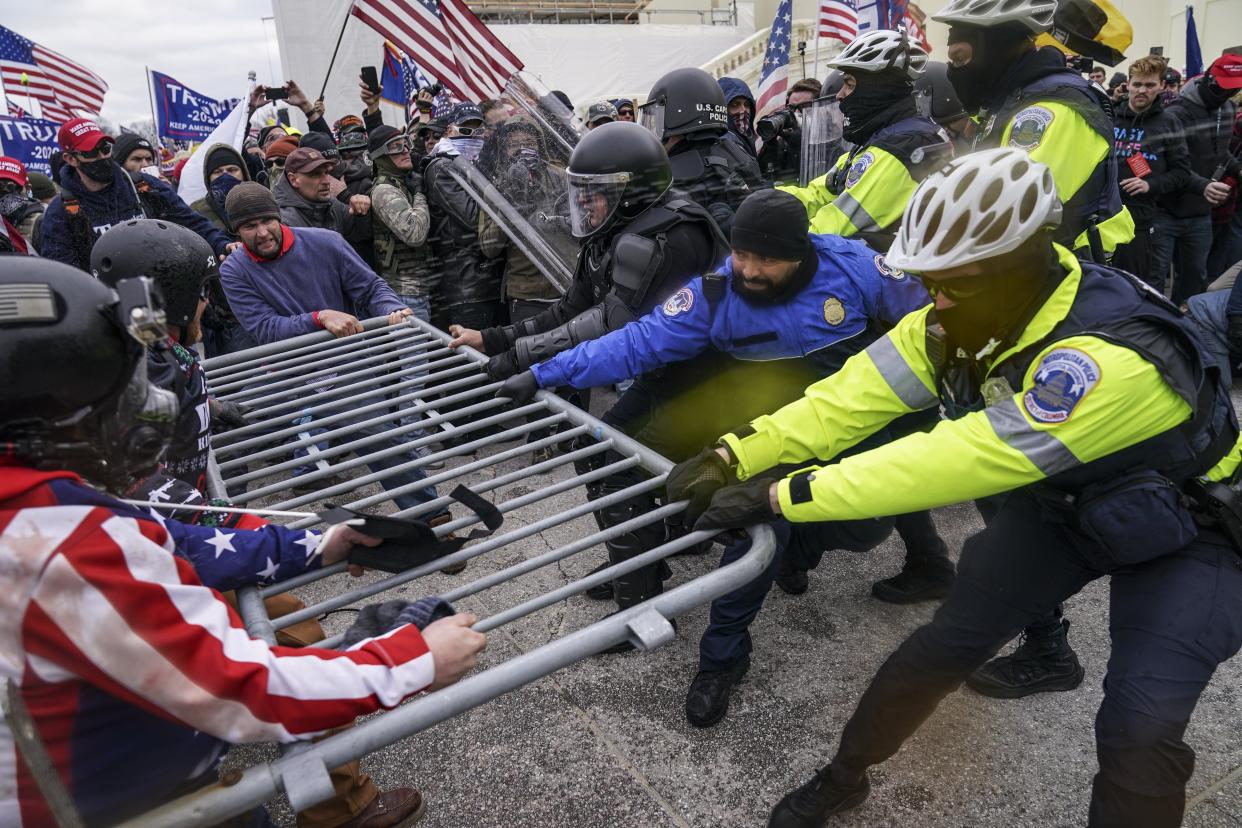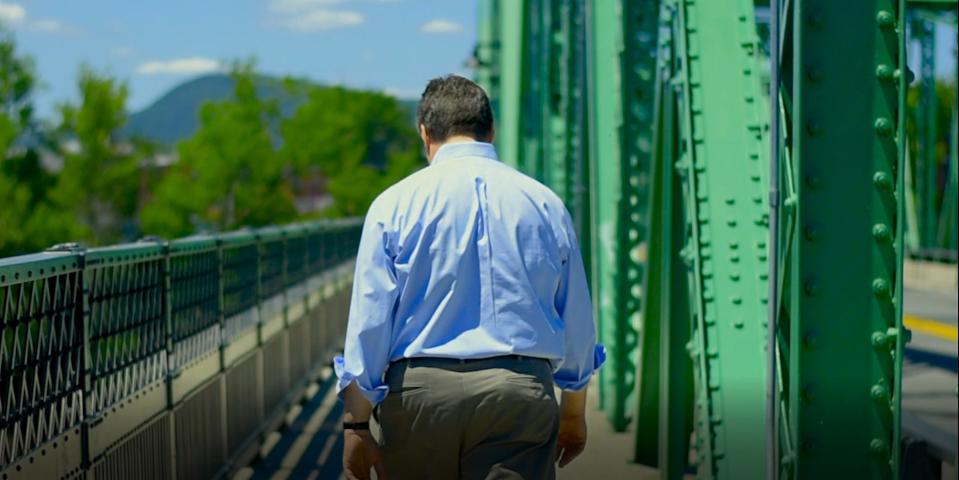Trump is not ruining democracy, we are. And it's been anguishing to confront: Tom Nichols

- Oops!Something went wrong.Please try again later.
I’ve written about a lot of unpleasant, even frightening, subjects. For most of my career, I have been a specialist in national security affairs, a cheerless area of study. I’ve written about war, terrorism, and even about the possibility of nuclear apocalypse, a project that required staring at maps and charts of how entire cities would be turned into ash and left for eternity as desolated mass graveyards.
And yet nothing was more difficult than writing about democracy in my own country. In the past, I brought – I hope – a scholarly and dispassionate eye to unpleasant subjects. Now, I was anguished. I was no longer writing about notional future wars or the faraway Russians. Now I was writing about my own people: my fellow citizens, my friends, my neighbors, my family.
And I did not like what I saw.
The people I have always counted on to be patriotic, sensible, and steady – like our ancestors had been under far more trying circumstances than our own – were now sirens of drama and complaint. Everything, they said, is as bad as it’s ever been. These, they were sure, are the worst times ever. We are all victims. Someone must pay.
Our choices have put us on the ropes
This is not the America in which I was raised. Something was wrong, and I wanted to know why millions of the citizens of my own nation – some of them near and dear to me – were now, astonishingly, embracing illiberalism and authoritarianism.
And so I wrote "Our Own Worst Enemy," in which I identify what I see as the greatest threat to democracy in the United States: We, the people.
This is hard to say and it was hard to write. It would have been easier to find other culprits and unite with my fellow Americans in a tribal and bracing hatred of globalization, or China, or immigration, all of which are real issues that require wiser policies. But democracy is not unwinding because of container ships or communists. It is on the ropes because of our own choices.

We, ourselves, have become unwilling to engage in civic life at even the most basic level of regular voting. We, ourselves, have embraced consumerism that demands ever better and ever cheaper products no matter what the cost to our own economy. We, ourselves, have chosen to be solitary viewers of television and social media, and then to express ourselves in public only with performative and childish rage.
Opinions in your inbox: The best insights and analysis every morning
I wish I could say that my concerns were only reactions to the noxious rise of Donald Trump and the tragedy of the insurrection at the Capitol. But that is untrue; long before Trump and long before I began the book that would become "Our Own Worst Enemy," I was worried.
The moments that weighed on me accumulated over the years. Friends who had grown up with me in economically strapped circumstances, for example, would tell me how they thought America was a disastrous mess – while sailing their boats, or sending me pictures from their multiple vacations. Political arguments that were once friendly jousting took on an almost religious hue.

Moments of weird nostalgia became more common, with people remembering grim years of industrial decline with a golden glow that I knew to be false. One of my hometown friends, for example, once pointed to a factory across the street we both lived on as boys and railed to me how he remembered when it was busy and full. But I reminded him that such a memory was literally impossible, because the building was already a mostly empty hulk when we broke its windows as kids in the early 1970s.
Tom Nichols: Biden warns Putin on human rights and cybersecurity in Geneva. US moral clarity is back.
What’s going on? Ironically, this growing illiberalism is not the product of bad times, but of a long trend of rising narcissism and a sense of entitlement that was enabled by peace, prosperity, and rapidly improving living standards. The United States and other democracies have real problems, but the rise of a sour and selfish abandonment of democracy is not happening because of social injustice or “economic anxiety.”
Worse, our democracy now practically must run on autopilot independently of a public that is happily and willfully ignorant of the issues and wants nothing to do with the dreary business of governing. And with increasing frequency, our form of government is under attack by bored working and middle-class citizens – led by clever political and television figures – who have no use for democracy other than as slogans and window-dressing around their need to be the constant center of their own reality show.
The January 6 rioters were the most extreme example of this stupefying level of narcissism. These insurrectionists were not disenfranchised or oppressed people trying to engage in a peaceful assembly. They could barely express a coherent political thought. Rather, the whole event was a day-camp outing for middle-aged, middle-class, gainfully employed Americans who wanted to be heroes storming Congress – and perhaps lynching the vice president in the process – and then go back home to sell real estate, attend work retreats in Mexico, and brag about it all on Instagram.
Revive maturity and stoicism
Over a half-century ago, the writer Eric Hoffer presciently saw the way such madness might overtake the democracies when he warned that anti-democratic mass movements begin not with deprivation and suffering, but with boredom and plenty. “Our frustration is greater when we have much and want more than when we have nothing and want some,” he wrote in 1951. “To a deliberate fomenter of mass upheavals, the report that people are bored stiff should be at least as encouraging as that they are suffering from intolerable economic or political abuses.”
Save us: Biden's top job is to autocrat-proof democracy after Trump. Six months in, he's failing.
The United States has fallen into this very trap. Our parents and grandparents had the fortitude to endure the 20th century, with two world wars and an economic disaster. In the 21st century, we lack the resilience even to overcome a pandemic, much less the great trials of a war or a depression. Worse, we are not mature or stoic enough even to endure the prosaic and often dull routines that are part of daily life.
We are suffering because we are successful. We are unhappy because we have what we want.
Time is running out. If we are to recapture our civic life and reinvigorate our liberal and constitutional inheritance, we must stop, right now, and – unpleasant and searing though it will be – take stock of ourselves and our own role in the decline of our democracy.
Tom Nichols (@RadioFreeTom) is a member of USA TODAY's Board of Contributors, a professor at the U.S. Naval War College and an instructor at the Harvard Extension School. His new book, “Our Own Worst Enemy: The Assault from within on Modern Democracy,” was published Aug. 19.
You can read diverse opinions from our Board of Contributors and other writers on the Opinion front page, on Twitter @usatodayopinion and in our daily Opinion newsletter. To respond to a column, submit a comment to letters@usatoday.com.
This article originally appeared on USA TODAY: Trump is not the problem with American democracy, we are: Tom Nichols

